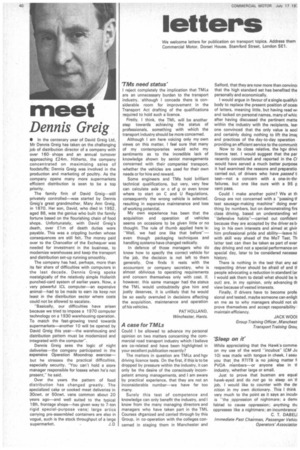meet
Page 42

If you've noticed an error in this article please click here to report it so we can fix it.
Dennis Greig
• In the centenary year of David Greig Ltd, Mr Dennis Greig has taken on the challenging job of distribution director of a company with over 160shops and an annual turnover approaching £24m. Hitherto, the company concentrated on maximizing sales of foodstuffs; Dennis Greig was involved in the production and marketing of poultry. As the company opens many more supermarkets efficient distribution is seen to be a top priority.
The family firm of David Greig—still privately controlled—was started by Dennis Greig's great grandmother, Mary Ann Greig, in 1870. Her son, David, who died in 1952, aged 86, was the genius who built the family fortune based on the flourishing chain of food shops. Unfortunately, with David Greig's death, over Elm of death duties were payable. This was a crippling burden whose consequences are still felt. The money paid over to the Chancellor of the Exchequer was needed for investment in the business, to modernize warehouses and keep the transport and distribution set-up running smoothly.
The company has had, perhaps, more than its fair share of difficulties with computers in the last decade. Dennis Greig spoke nostalgically of the relatively simple Hollerith punched-card system of earlier years. Now, a very powerful ICL computer—an expensive animal had to be made to earn its keep not least in the distribution sector where costs could not be allowed to escalate.
"Basically, our difficulties have arisen because we tried to impose a 1970 computer technology on a 1930 warehousing operation. To match the fast-growing trend towards supermarkets—another 10 will be opened by David Greig this year—the warehousing and distribution pattern must be modernized and integrated with the computer".
Dennis Greig sees the logic of night deliveries—the company participated in the expensive Operation Moondrop exercise— but he stresses the practical difficulties, especially security. "You can't hold a store manager responsible for losses when he's not present," he said.
Over the years the pattern of food distribution has changed greatly. The specialized cake or cooked meat deliveries in 30cwt. or 50cwt. vans common about 20 years ago—and well suited to the typical 18ft. frontage shops—has given way to 7-ton rigid special-purpose vans; large artics carrying pre-assembled containers are also in vogue, such is the stock throughput of a large supermarket. J.D








































































































